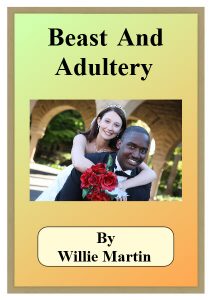We know from a study of the Scriptures that the word beast means a race or people who are not Israelites. In other words the Chinese, Jews, Negroes, as well as evil men who are both Israelites and non-Israelites.
From New Unger’s Bible Dictionary (originally published by Moody Press of Chicago, Illinois. Copyright (C) 1988).
Figurative. In a figurative or symbolical sense, the term frequently occurs in Scripture and generally refers to the sensual and grovelling or ferocious and brutal natures properly belonging to the brute creation. The psalmist speaks of himself as being “like a beast” before God, while giving way to merely sensuous considerations (Psalm. 73:22).
The Word Is Sometimes Used Figuratively of Brutal Men. Hence the phrase “I fought with wild beasts at Ephesus” (1 Corinthians 15:32, cf. Acts 19:29) is a figurative description of a fight with strong and exasperated enemies. For a similar use of the word see (Ecclesiastes 3:18; 2 Peter 2:12; Jude 10).
And While Beast Is the Symbol of Selfish, Tyrannical Monarchies. The four beasts in (Daniel 7:3,17,23), represent four kingdoms (Ezekiel 34:28; Jeremiah 12:9).
In the Apocalypse the Beast Obviously Means a Worldly Power Whose Rising Out of the Sea Indicates That It Owes Its Origin to the Commotions of the People (Revelation 13:1; 15:2; 17:8).
The “four beasts” (Gk. zoa, “living creatures,” not therein, “beast” in the strict sense) of the KJV of (Revelation 4:6) should be rendered “four living ones” or “four living creatures” (so NASB and NIV). See Cherub, Cherubim. (from New Unger’s Bible Dictionary) (originally published by Moody Press of Chicago, Illinois. Copyright (C) 1988.)
